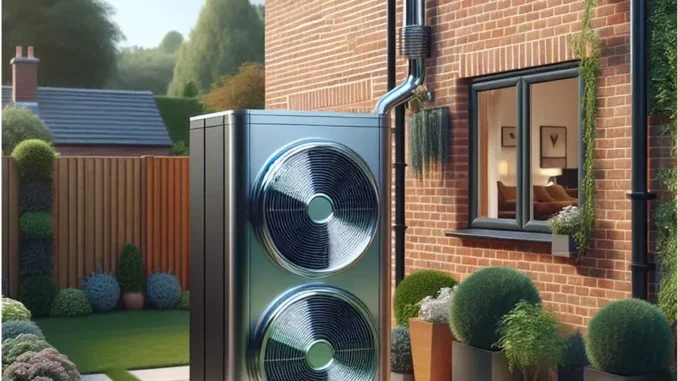
Summary
Surging Heat Pump Installations Signal UK’s Green Energy Transformation
The UK has witnessed an unprecedented surge in heat pump installations, with a record 42,064 units installed from January to September 2024, as reported by the Microgeneration Certification Scheme (MCS). This increase not only highlights a shift in consumer preferences towards sustainable energy but also underscores the growing number of certified professionals in the sector. James Rudd, a seasoned installer, sheds light on this transformative period, emphasising the role of MCS certification and the challenges ahead to meet the government’s ambitious targets.
Main Article
Record-Breaking Installations
In a vibrant workshop filled with tools and the latest technology, James Rudd, an experienced heat pump installer, reflects on a year that has redefined the UK’s energy landscape. “Honestly, it’s been a whirlwind,” Rudd remarks with an air of enthusiasm. “The demand has been through the roof. I’ve been in this game for over a decade, and I’ve never seen anything like it.”
This sentiment is echoed in the latest figures from the MCS, which reveal a substantial 42,064 heat pump installations in the first nine months of 2024, surpassing the entirety of the previous year. This growth signals not only a burgeoning consumer interest in sustainable energy solutions but also a notable rise in the number of certified installers ready to meet this demand.
Certification and Consumer Confidence
Rudd, who represents EcoTech Solutions, highlights the significance of obtaining MCS certification in his career. “Getting certified was a game-changer,” he asserts. “It opened up so many doors, especially with the government’s Smart Export Guarantee. People want to know they’re getting quality installations that meet all the standards, and that’s what MCS certification provides.”
Despite being voluntary, the MCS certification is regarded as the gold standard for households looking to access government schemes. With over 5,000 certified installers now active, the industry is experiencing a transformation in both quantity and quality, enhancing consumer confidence significantly.
The Retrofit Revolution
Rudd observes a trend towards retrofitting rather than new builds, a point supported by MCS data showing that 88% of air-source heat pump installations are retrofits. “It’s a bit more challenging, sure, but it’s incredibly rewarding. People are looking to make their existing homes more sustainable, and that’s where we come in,” he explains.
Despite the impressive progress, the UK National Audit Office has highlighted that the current installation pace, while significant, still falls short of achieving the government’s target of 600,000 installations annually by 2028. Rudd acknowledges this challenge, expressing optimism: “It’s ambitious, but I believe it’s achievable. With more awareness and continued government support, we can get there.”
Emerging Trends and Future Prospects
Beyond the surge in heat pump installations, the UK’s energy landscape is evolving in other ways. While interest in small-scale solar installations has waned, battery storage systems are gaining traction. MCS data indicates a rising interest in battery storage, and Rudd is keen to expand his expertise in this area. “It’s the future. People want to store what they generate, and batteries are key to that,” he says.
However, Rudd voices concerns about the current state of certifications, particularly regarding solar and battery installations. “There’s a lot of installers who are certified for solar but not yet for batteries, and that can lead to confusion. Consumers need clarity and assurance that everything is above board,” he notes.
As the MCS works on enhancing its framework and consumer protection, Rudd remains optimistic. “It’s all about adapting and growing. We need to ensure that the industry remains robust and trustworthy. The reforms they’re planning are much needed, especially in setting standards that everyone can follow,” he concludes.
Detailed Analysis
The surge in heat pump installations in the UK reflects broader economic and environmental trends. As consumers increasingly prioritise sustainability, the demand for green technologies is set to rise. This shift aligns with government initiatives aimed at reducing carbon emissions and achieving net-zero targets. The growing number of MCS-certified installers is a testament to the industry’s commitment to maintaining high-quality standards, fostering consumer trust and confidence.
The focus on retrofitting existing homes rather than constructing new builds suggests a pragmatic approach to achieving sustainability goals. This trend is likely to continue as homeowners seek to improve energy efficiency and reduce their carbon footprint. Meanwhile, the increasing interest in battery storage highlights a critical area for future growth, underscoring the importance of energy independence and resilience.
Further Development
As the UK strives to meet its ambitious target of 600,000 heat pump installations per year by 2028, the industry is poised for further expansion and innovation. Ongoing government support and policy frameworks will be crucial in sustaining this momentum. Meanwhile, the MCS is expected to enhance its certification processes, particularly in emerging areas such as battery storage, to ensure that consumer protection and industry standards keep pace with technological advancements.
Readers are encouraged to stay engaged with Bloomberg’s coverage of the UK’s green energy transformation, as we continue to monitor developments in the heat pump sector and broader trends in sustainable technology. Further insights into policy changes, market dynamics, and industry innovations will be provided as the story unfolds.

